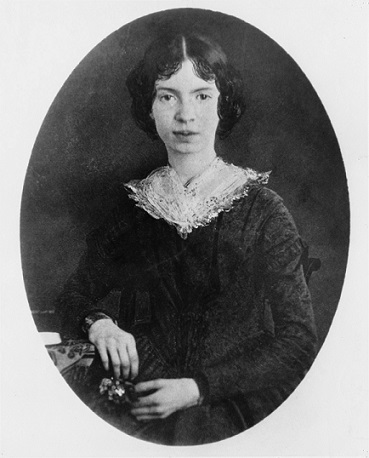|
home | what's new | other sites | contact | about |
||
|
Word Gems exploring self-realization, sacred personhood, and full humanity
Emily Dickinson Wild nights - Wild nights!
Emily Dickinson (1830-1886)
Wild nights - Wild nights! Futile - the winds - Rowing in Eden -
from https://www.litcharts.com/poetry/emily-dickinson/wild-nights-wild-nights
Dickinson’s compact poem is a small explosion of desire. The speaker imagines herself as both a sailor and a boat on a stormy sea, wishing desperately to be resting in the “port” of her love (an image with a strong sexual innuendo built into it). The poem ultimately presents passionate love as something paradoxical: it’s both wild and comforting, dangerous and secure. The speaker begins by exclaiming “Wild nights - Wild nights!” as if looking out into a storm. She then imagines how her experience of such nights would be transformed into “luxury” if her beloved were with her. Aside from the literal storm the speaker is looking out into and wishing she could share with her beloved, those “wild nights” and their “luxury” (a word that had sexual connotations in Dickinson’s time) suggest a passionate sexuality. In other words, the speaker is implying that, if only her beloved were around, they’d have a great time. The speaker goes on to build a contrasting image of the satisfied, passionate heart as a boat in port, beyond the reach of storms. The speaker’s image of herself as a boat resting in a harbor creates a sense of simultaneous calm and wildness. While “the winds” would still be blowing if she were safely harbored with her love, those winds would be “futile,” unable to affect her in the way they do now. The security of satisfied love would create a place of safety and rest within her wild desire. The image of the speaker as a boat at sea suggests her own smallness and helplessness in proportion to the ocean of her desire, but also her determination: the “compass” and “chart” give a sense of her drive to seek a known place, and then to be done with that searching. In representing her beloved as the port, she creates a feeling that the beloved is her home, a place of undisturbed security. Being with her love, again, offers both a sense of wildness and tranquility. In the final stanza, the speaker’s use of religious imagery completes her picture of passion as a thing that is simultaneously stormy and calm. From the wild nights of the previous stanzas, the speaker transitions into a quite different image: “rowing in Eden.” Eden, the earthly paradise from the Bible, is an image of perfection—and of shameless sexuality. (Readers may remember that before Adam and Eve eat the forbidden fruit and are driven from Eden, they are naked and unashamed.) To be “rowing in Eden,” then, is to be on a calmer and more blissful sea than the one the speaker has previously shown. The exclamation “Ah! - the sea!”, in both its energy and its ambiguity, then brings together all the visions of passion readers have seen so far. That “Ah!” could be a cry of relief, of fear, of pleasure, or of pain—and all of these possibilities are present at once. Finally, the poem closes on a passionate punch: if you’re thinking that the “in” of “in thee” is a pretty vivid sexual image, you are not wrong. The speaker is utterly caught up in her imagining of the sexual consummation she wishes for with her beloved. Longing and Absence “Wild nights - Wild nights!” can be read, on the one hand, as a poem about the simultaneous wildness and comfort of sexual intimacy. But the speaker’s beloved never actually appears in the poem; the whole thing is simply the speaker imagining how great things would be if the beloved were there. This doesn’t make the poem any less passionate or exciting, however, and in this way, the poem suggests that there is a strange pleasure in the longing itself. In the first stanza, the poem creates a tension between what is and what the speaker wishes were so. The subjunctive “were I with thee” sets up the whole dilemma of the poem. All of the poem’s energy surrounds the absence of the beloved. The speaker’s imagining of the fulfillment of the night that could be, if the beloved were only there, evokes by contrast the intense longing that she is actually experiencing. The image of the boat securely resting in port further suggests an opposite reality: the speaker’s heart is being tossed around on the seas of passion even as she describes consolation. While the speaker’s image of the boat in port evokes feelings of comfort and security, it also emphasizes the speaker’s different reality: she is not in this comfortable port she imagines, and not with her lover, but still out on the sea being knocked around by the winds of desire. This doesn’t seem to distress the speaker all that much, however. On the contrary, the final stanza suggests the deliciousness of this longing in its own right. From the images of storms and seeking in the second stanza, the speaker abruptly transitions into the very different image of “rowing in Eden.” The seas of Eden—flawless, shameless, and calm—suggest a deep pleasure in the speaker’s at-sea-ness. Even if it isn’t everything she wishes for, there’s a delight in her desire for her beloved. The speaker’s exclamation, “Ah! - the Sea!”, further emphasizes the complexity of her response to her own predicament. That “Ah!”, following both the images of the storm and of Eden, could equally be a cry of pleasure or of pain, once again suggesting the intensity of the speaker's desire itself. The poem then ends on a return to the subjunctive: “Might I but moor - tonight - / In thee!” In her passion, the speaker’s feeling of “if only” has become itself both a storm and a resting-place.
|
||
|
|
